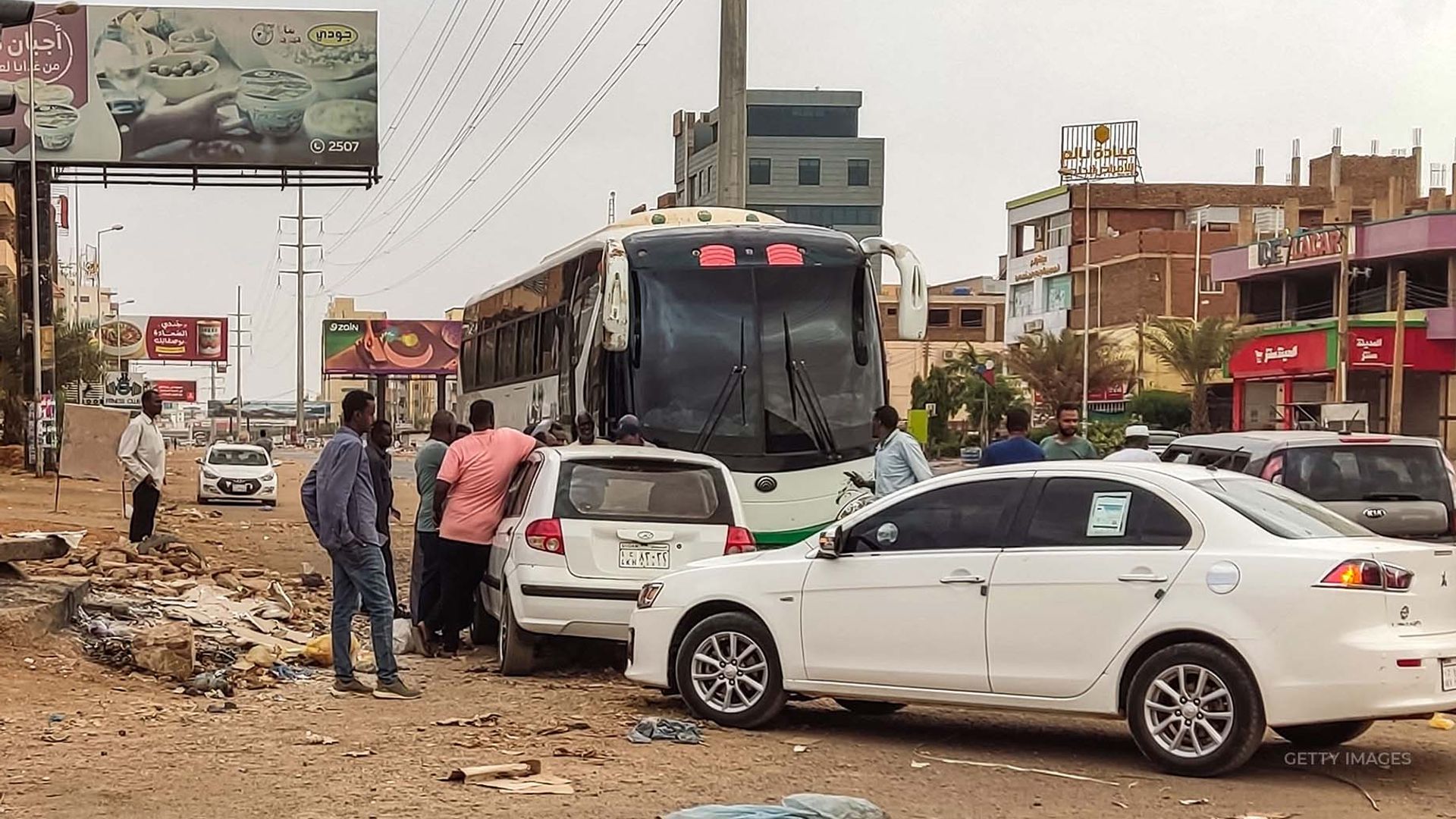
Commentary
-
Our commentary partners will help you reach your own conclusions on complex topics.
The recent outbreak of conflict in Sudan’s capital, Khartoum, and the harrowing tales from Americans of their escape raises the question, what does the United States are with citizens trapped in conflict zones? For the 16,000 or so Americans left behind in Sudan after US embassy personnel were evacuated on April 23. The answer was much more than the unlimited support they received, and at least two Americans have already been killed in the fighting. Legally, the US government has no requirement to evacuate citizens caught in dangerous situations abroad, but it is obligated to have plans in place for potential scenarios. And the State Department has improved its travel warning system and has a Smart Traveler Enrollment Program to receive embassy alerts. These resources are to aid Americans in making informed decisions about their own travel plans, including the US government security recommendations. The Biden administration has emphasized that it is quote, not standard practice for the United States to send in the US military into war zones to extract all American citizens. According to US national security adviser Jake Sullivan, the United States didn’t do it in Libya, Syria, Yemen, or more recently in Ukraine, Afghanistan, said Sullivan was a unique case. But that doesn’t mean that the US government has not conducted noncombatant evacuation operations in the past. In fact, US Marines have conducted such operations multiple times in the last few decades. And the US State Department organized evacuation efforts from Lebanon in 2006. When war broke out, still, the State Department had signaled the risks associated with remaining in Sudan for years. It issued a do not travel warning to Americans in August 2021. Unauthorized the departure of non emergency US personnel in October of that year, downsizing the embassy. Additionally, President Biden said in February 2022, that Americans should not expect the United States government to conduct the same sort of evacuations from places like Ukraine or Ethiopia, as it did from Afghanistan. Many of the Americans in Sudan were not tourists or businessmen, but dual nationals with Sudanese family members who live in the country, or aid workers delivering much needed assistance. Family Ties do not disappear when the security situation worsens, and the need for humanitarian aid actually increases during this time. Most of these private citizens were left to their own devices to find their way out of Sudan. As a security situation deteriorated, and violence became much more unpredictable. The initial message from the embassy even after the US military aided an evacuation was for Americans to shelter in place, and that it would provide guidance to help Americans who desire to leave about which routes appeared to be safe. Meanwhile, many European and regional partners were actively facilitating the departure of their own citizens and Americans space permitting by airlift from to airstrips outside the capital or other means such as convoys. The US government kept repeating the conditions did not support such an organized effort. Ultimately, a week after US personnel had fled the country. The United States government organized three convoys to take Americans to port Sudan from where they could travel to Jeddah Saudi Arabia. The scramble to get American personnel out of the country, combined with a chaotic effort to respond to demands to help American citizens still in the country, revealed how unprepared the United States government was for this crisis. It also shows how low the tolerance for risk remains at the State Department, a hangover from what happened over a decade ago in Benghazi Libya. Experts who follow Sudan closely have noted that all the warnings that were was coming were there in terms of what Americans should expect to their government. It fell short this time. But the insistence that the US military should have conducted an operation to evacuate private citizens from Sudan is misplaced. Unlike American staffing, the US Embassy and on official government business in Sudan, these citizens were in the country in a private capacity. The support they received should have been better coordinated, certainly. But American soldiers should not be placed in harm’s way to rescue private citizens who had ample warning of the risks they were taking
-
US should help Yemen fight Houthis
Recent Houthi attacks on U.S. Navy vessels and U.S. counter-strikes against Houthi targets in Yemen have triggered a foreign policy debate on how the United States should proceed and on whether a larger U.S.-Houthi conflict might be imminent. Houthi leaders say that their aim is to impede Israeli trade and shipping, even though many of… -
US must respond to threat from Iran-backed Houthis
Last month, the commander of Iran’s Islamic Revolutionary Guards Corps Quds Force told the head of Hamas’ military wing that Iran will do “whatever it takes” to support them in its war with Israel. Meanwhile, the Iranian-backed Houthi rebels in Yemen intensified attacks on commercial ships in the Red Sea, prompting U.S. warships to shoot… -
US, Israeli counterterrorism policy must adjust after Hamas attack
Revered Israeli and U.S. intelligence agencies failed to detect the signs of an imminent Hamas attack on Israeli villages near the Gaza Strip. The surprise attack was planned within Hamas’s military wing and highlights both Israel’s intelligence blind spots as well as Hamas’s use of “old-school techniques” like in-person communication. Straight Arrow News contributor Katherine… -
US must sustain pressure against al-Qaeda
The United States and its allies have severely reduced the capacity for al-Qaeda, the terrorist group behind the 9/11 attacks, to organize or carry out any large-scale terrorist attacks against the U.S. homeland. Recent U.S. intelligence assessments suggest al-Qaeda is weaker than ever in Afghanistan, while experts and international observers continue to warn that al-Qaeda is… -
African coups demand US policy changes
A string of recent military coups toppling governments in the African Sahel, from Guinea to Sudan, poses new risks and challenges to the United States. France, formerly a key ally in African security affairs, has also massively reduced its forces on the continent, at times being chased out by pro-Moscow forces. Straight Arrow News contributor…
Latest Stories
-
 Getty Images
Getty Images
Hunter Schafer’s passport identifies her as male following executive order
-
 Reuters
Reuters
Diddy’s defense attorney abruptly requests withdrawal from case
-
 Getty Images
Getty Images
Trump fires Air Force Gen. CQ Brown as chairman of Joint Chiefs of Staff
-
 Getty Images
Getty Images
Trump restricts Chinese investment in American ‘critical strategic assets’
-
 Getty Images
Getty Images
MLB Spring Training: Can the Yanks hold off the O’s, Sox and Jays once again?
Popular Opinions
-
In addition to the facts, we believe it’s vital to hear perspectives from all sides of the political spectrum.
Latest Opinions
In addition to the facts, we believe it’s vital to hear perspectives from all sides of the political spectrum. We hope these different voices will help you reach your own conclusions.
The opinions published in this section are solely those of the contributors and do not reflect the views of Straight Arrow News.





















Latest Commentary
We know it is important to hear from a diverse range of observers on the complex topics we face and believe our commentary partners will help you reach your own conclusions.
The commentaries published in this section are solely those of the contributors and do not reflect the views of Straight Arrow News.
Dr. Frank Luntz
Pollster and Political Analyst‘Getting rid of them’: Americans discuss Trump and immigration
‘Woke’: Why some Biden 2020 voters backed Trump in 2024
‘A promise’: Cadets describe their journeys at West Point